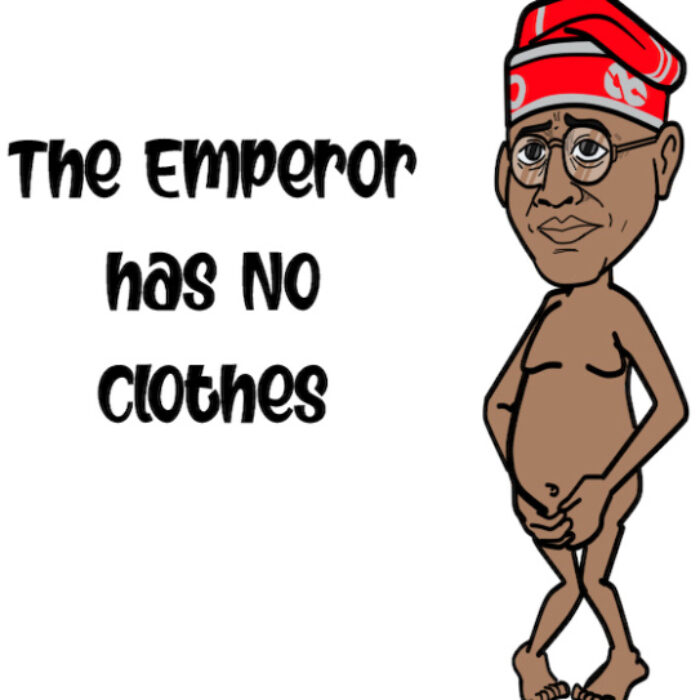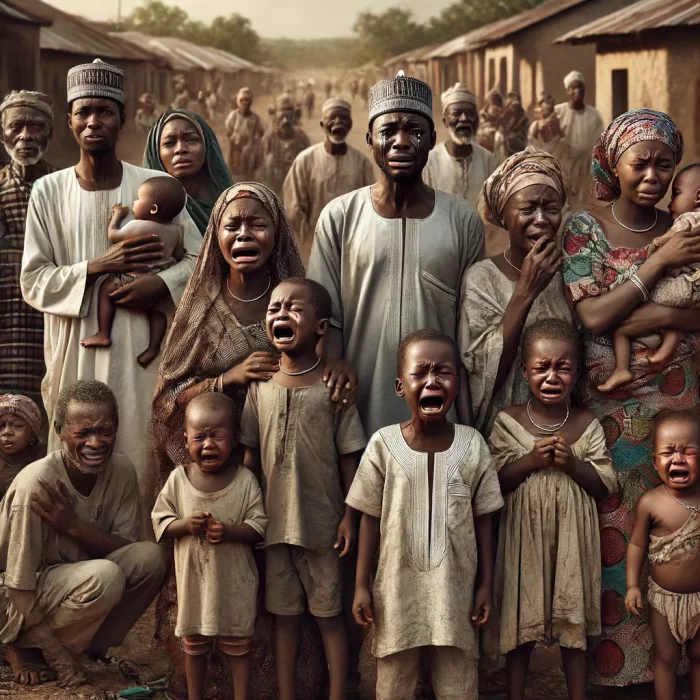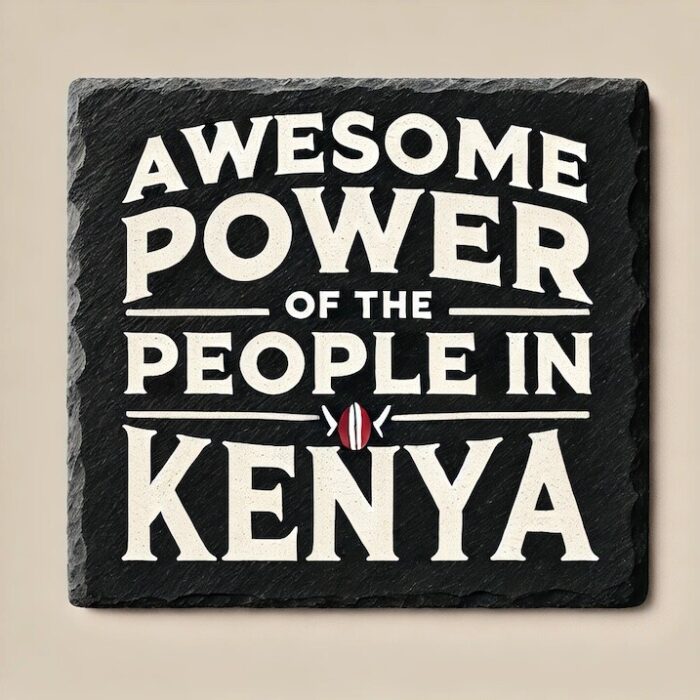By Nnaoke Ufere, PhD
In under four months, the Tinubu administration has steered Nigeria into a perilous and tumultuous period, marked by a series of impulsive and hazardous policies that have inflicted severe hardships and widespread suffering upon its citizens. Regrettably, President Tinubu’s unforced errors stand as the foremost cause of this unparalleled catastrophe.
The repercussions have been particularly disastrous, leading to a startling surge in costs of living, mass poverty and a disheartening increase in what experts term “deaths of despair.”
In a recent survey carried out by the African Mind Journal, encompassing a diverse sample of 1,500 Nigerians, a significant majority, constituting 75%, openly voiced their disapproval of Mr. Tinubu’s performance.
In contrast, his approval rating stands at a mere 25%, underscoring a noteworthy level of discontent within the population. Particularly striking is the fact that an overwhelming 85% of Nigerians expressed dissatisfaction with his management of the economy.
What emerges as particularly noteworthy is that 60% of Nigerians who asserted they voted for President Tinubu now acknowledge experiencing “voter’s remorse.” This acknowledgment reflects their disapproval of his governance and the trajectory he has set for the nation.
Astonishingly, there appears to be an unnatural absence of the expected resistance and mass protests against these adverse conditions, with the Nigerian populace seemingly frozen and immobilized in the face of the evident ineffectiveness and detrimental impact of the Tinubu administration.
Nigeria, a nation endowed with abundant oil wealth, paradoxically finds itself grappling with a stark reality where the majority of its citizens are unable to access even the most rudimentary necessities of life.
An alarming 120 million people are relegated to subsisting on less than one dollar per day, while the official unemployment rate, despite official claims to the contrary, remains alarmingly high at 36%.
The grim specter of inflation, currently raging at a staggering 31% at the grassroots level, relentlessly erodes the purchasing power of ordinary Nigerians, subjecting numerous families to severe financial duress.
Basic essentials like food, medications, housing, and school fees are increasingly slipping beyond the reach of ordinary citizens. Tragically, the percentage of the population grappling with acute undernutrition has swelled to an alarming 29% since Tinubu assumed office.
The Nigerian economy languishes in a state of stagnation, characterized by a conspicuous absence of innovative and forward-thinking national economic strategies. It is ensnared in a web of fiscal mismanagement, weighed down by excessive borrowing and unchecked government spending, and plagued by pervasive corruption that thrives within a bloated government bureaucracy.
Prominent international economists have critically scrutinized Tinubu’s economic approach, dubbing it “fraudonomics.” This label reflects the administration’s propensity for making grandiose yet empty claims, coupled with a glaring dearth of substantial ideas and meaningful actions. The economic team appears to be improvising without introducing any novel or innovative concepts to address the nation’s economic woes.
Recent events have added another layer of concern to the already troubled landscape. The verdict of the Presidential Election Petition Court (PEPC) regarding the 2023 presidential election has raised suspicions of premeditated outcomes, as reported by various media outlets.
This casts a shadow of doubt on the integrity of the democratic process and erodes public trust in the institutions such as INEC and the judiciary meant to safeguard the nation’s democratic principles.
In spite of Nigeria’s dire economic situation, widespread suffering, the loss of thousands of lives due to hunger and despair, and the contentious decisions taken by the PEPC, only a minority of its population has engaged in street protests to assert their inherent right to self-defense.
This prevailing sense of demoralizing passivity among Nigerians has prompted a critical examination of the factors contributing to this state of inertia and the potential avenues for reinvigorating their civic engagement to take back their country.
In this essay, I delve into strategies that can motivate Nigerians to actively address their concerns and reclaim agency in shaping the destiny of their nation.
The first factor underpinning this lack of collective action among Nigerians is a deep-seated division along tribal lines. Tribal affiliations often supersede national identity, leading individuals to prioritize loyalty to their ethnic group over the broader interests of the country.
This polarizing tribal prejudice shapes the way Nigerians view and react to the issues facing their nation. For example, people like Wole Soyinka may uphold or endorse political figures like Tinubu not because of an impartial evaluation of their politics and policies, but rather due to tribal loyalties.
This tendency to overlook detrimental consequences engendered by political leaders due to tribal affiliations hampers the collective response to political malpractice and misgovernance, as demonstrated by Tinubu and his administration.
Bribery and incentives play a significant role in perpetuating passivity. The Tinubu administration has been accused of employing tactics to co-opt compliance through incentives while penalizing any form of opposition.
For instance, the Nigerian Labour Congress initially threatened protests in response to the abrupt removal of fuel subsidies without consideration for its consequences, a move that would adversely affect the population. However, there are allegations that their leaders have succumbed to the allure of private incentives, leading to silence and claims of “ongoing negotiations.” This underscores the influence of bribery in stifling dissent and collection action.
Another facet of this passivity is the misplaced belief in divine intervention. Many Nigerians have placed excessive faith in God’s role in rescuing them from the challenges posed by the Tinubu administration. While faith is a powerful source of solace and resilience, expecting divine intervention to replace irresponsible governance might be considered a form of complacency or evasion of civic responsibility.
This reliance on divine intervention has contributed to a sense of hopelessness, with many individuals passively accepting their dire circumstances as the will of God, despite enduring immense hardship, suffering and death.
Additionally, the political elite, often in collusion with religious leaders, seem to exploit this passivity. They are well aware that the populace is willing to endure almost any condition without resistance or questioning. Voices remain muted, and individuals hesitate to take a stand, even in the face of severe hardships and suffering, which are frequently the result of man-made policies and decisions.
In the face of these multifaceted challenges that have sapped the proactive spirit of Nigerians, it becomes increasingly evident that change will not manifest solely through prayers. It is as if God is sending a message to the Nigerian people, urging them to transform their supplications into action. The divine endowment of the capacity to fight for their God-given rights and reclaim their humanity is a call to action that cannot be ignored any longer.
Intimidation and fear tactics have been potent tools in the government’s arsenal to stifle public dissent. A stark example of this was witnessed during the #EndSARS campaign, when the government, led by former President Buhari, resorted to extreme measures, employing deadly force against innocent citizens who dared to speak out.
Unfortunately, this campaign of intimidation appeared to have succeeded in instilling fear among the populace, rendering many hesitant to engage in peaceful protests. The fear of potential violence at the hands of the Nigerian police has become a paralyzing force.
The oppressive Buhari government’s aim was clear: to deter Nigerians from exercising their legal and divinely granted right to peaceful protest as a means of self-defense.
Finally, the Tinubu administration has skillfully employed propaganda to manipulate Nigerians into embracing passivity and accepting bad governance as the norm. This has been achieved by promoting a warped societal construct labeled “resilience,” which seeks to portray mass suffering as a virtue.
For example, Tinubu often extols the “resilience of the Nigerian people” in the wake of impulsive policy blunders, such as the ill-advised and untimely fuel subsidy decision that led to a significant spike in living expenses, without provision of adequate welfare assistance. In truth, when Tinubu invokes the term “resilience,” he is subtly endorsing passivity, reinforcing the idea that enduring suffering without resistance is virtuous.
To break free from this cycle of fear, intimidation, and propaganda, Nigerians must recognize their inherent power to effect change. They must shed the passivity that has been imposed upon them and reclaim their voices as active participants in the nation’s democratic process.
This means standing up against injustice, holding their leaders accountable, and engaging in peaceful protests without fear. Only through collective action can they reclaim their rights, restore their dignity, and reshape the future of their beloved nation. The path to change lies not just in prayers, but in the unwavering commitment of the people to be the catalysts for a better Nigeria.
The Compelling Case for Action NOW
Nigerian politicians favor the existing state of affairs because they reap the benefits. Thus, a political system at rest will remain stagnant unless subjected to a substantial external force. It is, therefore, paramount for Nigerians to heed the poignant warning of Assata Shakur: “Nobody in the world, nobody in history, has ever gotten their freedom by appealing to the moral sense of the people who were oppressing them.” The current cadre of Nigerian politicians will only undergo meaningful transformation when they are compelled to do so.
In the words of Martin Luther King Jr. from a speech in 1967, “A riot is the language of the unheard.” President Tinubu appears impervious to the cries and suffering of the millions of impoverished Nigerians struggling to afford basic necessities. He has shown indifference to the plight of the countless unemployed youth despairingly wandering the streets, and he has turned a blind eye to the skyrocketing cost of living resulting from his administration’s policy blunders.
When your votes hold no sway, your voice remains unheard, and your suffering is dismissed, the uncomfortable reality is that civil disobedience and peaceful protest become the sole viable options for change.
To be unequivocal, this is not a call for harm or violence – those are the tactics President Tinubu seems to be employing against the Nigerian people. It is a plea for Nigerians who cherish their homeland to break free from their paralysis, awaken from their slumber, and reclaim their nation before the risk of permanent loss looms large.
Historical lessons abound. The French Revolution did not overthrow the tyranny of the elites and dismantle the monarchy through passive submission. The Chinese Revolution did not liberate oppressed peasants through inaction. The Aba Women’s Riots of 1929 did not pave the way for decolonization and women’s suffrage in Nigeria through passivity.
Therefore, to reclaim their humanity and salvage their nation from the precipice of devastation, Nigerians must exercise their inherent right to engage in peaceful protests and civil disobedience. The oppressed and long-suffering people of Nigeria possess the fundamental right to self-defense. Throughout history, when the oppressed have risen in collective defiance, they have demonstrated the potential to bring about meaningful and positive change.
The hope remains that Nigeria will one day emerge from this challenging period, armed with a proactive citizenry and visionary leadership capable of steering the country toward a brighter and more prosperous future.




